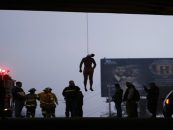California Law Prop 47 Allows Thieves To Steal As Much As They Want With No Consequences As Long As They Do This….
by Tj Sotomayor December 17, 2019 0 commentsCA Says, Steal What You Will!
By: Tommy “Tj” Sotomayor
After Proposition 47: Crime and No Consequences in California

The 2014 ballot initiative had unintended results galore.
California’s Proposition 47 downgraded a variety of “non-serious, nonviolent crimes” that had previously been considered felonies to misdemeanors. These include shoplifting, grand theft, receiving stolen property, forgery, fraud, and writing bad checks. As long as the total value of the stolen property is under $950, only a ghost of an offense has occurred. A thief may now steal something under that limit on a daily basis and it will never rise to felony status.
In the event that a perpetrator is pursued and apprehended, the consequence can be a small fine or a brief stay in jail, In reality, these repercussions are rare. In addition, DNA samples aren’t collected from misdemeanor offenders. Thus the DNA database has shrunk, making it more difficult for law-enforcement agencies to solve cold cases, including those involving rape and murder.
The underlying premise of Proposition 47 was to free up funds so the state could focus on violent and serious offenders. Savings would be diverted to school-based prevention and support programs, victim services, and mental-health and drug treatment. Therefore petty thieves, who might be drug addicts, would avoid costly and ultimately detrimental incarceration. The referendum had the support of California Democratic party and the American Civil Liberties Union, and the state’s voters passed it into law in 2014.
What could possibly go wrong?
That question is best asked of the people in California who are robbed and call the police for help. Overall, they’re blindsided by the slow (or non-) response. The surprise and anger they feel is tremendous. Nearly a thousand dollars in stolen property is hardly minor, especially to those who have little to lose. It’s not just the loss of personal possessions they’ll probably never see again that is so distressing, but the ruined trust in the system that they assumed was designed to protect the innocent.
For law enforcement, however, there is little incentive to chase down low-level criminals. Even if the person is escorted to the station, odds are great he’ll be back on the street in an hour or so.
Outrage in these circumstances is apolitical. A liberal Berkeley student studying in a café whose laptop is swiped from a table feels just as violated as the right-leaning visitor to Los Angeles whose luggage is stolen. A struggling small-business owner wonders how long he can withstand the damage done by constant pilfering.
“Every bicycle in our building has been stolen,” says Karen Burns, president of a San Francisco condo association. “I’ve caught so many people stealing packages. They don’t care. They know nothing will happen to them. It’s crazy. It’s horrible. I feel like these people need to go to jail.”
Proposition 47 didn’t stop with theft. The personal use of illegal drugs was also reclassified to a misdemeanor. Although the intent may have been kind (it’s cruel to punish people for having an addiction) and practical (they’ll emerge from prison hardened, and a felony on their record makes it more difficult to reintegrate into society), the downstream impact on the community at large has been disastrous. In San Fransisco, for example, shooting up in public is commonplace, whether it’s on the steps of City Hall, in front of a supermarket, or at the entrance to a children’s playground.
Residents who are experiencing an uptick in so-called low-level crimes in their neighborhoods are baffled by studies indicating otherwise. For example, a December 2017 Center on Criminal and Juvenile Justice report shows property crimes down by an average of 18.1 percent across the state. Those numbers are false, says Michael Rushford, president of the Sacramento-based Criminal Justice Legal Foundation, a nonprofit public-interest law organization: “More, not fewer, of these crimes are being committed, but people aren’t reporting them. In most cases they have to do it online, and they end up not doing it. They don’t believe anything will happen, so don’t see the point. And they’re right.”
In fact, Magnus Lofstrom, a researcher at the Public Policy Institute of California, pointed to a 12 percent jump in larceny-theft (essentially, unlawfully taking someone’s property) in the state immediately after Proposition 47 took effect. “Crime rates always fluctuate, and the data isn’t always accurate,” says Lofstrom.
CertainlySan Franciscans aren’t debating whether or not crime is up. They know it is. In January, Police Chief William Scott acknowledged a 24 percent jump in property crimes from 2016 to 2017. Auto break-ins have soared in every district, and the arrest rate for them is an astonishing 1.6 percent. Citizens are right to feel disgusted and demoralized. In areas such as the Tenderloin, which is home for many of the city’s low-income immigrants, impoverished senior citizens, and families with young children, quality of life has deteriorated. Now more than ever, residents and merchants are living with a proliferation of addicts who roll up their sleeves, inject, and then nod off on the sidewalks or career down the street and into traffic. To fulfill customer demand, dealers sell packets of powder or pills in plain view of passers-by. There is no reason to hide. Why not shoot up wherever you want, leave bloody syringes in piles, steal, and deal when there are few if any consequences?
But there are repercussions, and they’ve felt by every person — young and old, rich and poor — who is robbed and lives among the growing cadre of drug users and dealers and what it’s all done to their neighborhoods.
As in cities across the state, police departments hold community meetings to discuss crime and safety issues. Citizens arrive, frustrated and ready to vent. They won’t be placated with positive statistics. During a recent gathering in San Francisco’s Russian Hill — a beautiful neighborhood that boasts that famous crooked street, Lombard (now infamous for being haunted by rings of gang members who break into cars, steal tourists’ belongings, and relieve news crews of equipment) — an older gentleman who was born and raised in the city now says he feels like a prisoner in his home, afraid to leave. Officers, who are doing their best, urge residents to call the police and report crimes. Yet people are acutely aware that even if they do, justice won’t be served. So they direct their rage toward the police with a “you’re not doing your job!” No one leaves happy.
Regarding the money saved by Proposition 47 — a reported $103 million — it is just now being distributed. In June of 2017, the Board of State and Community Corrections granted the funds to 23 applicants “whose rehabilitative programs were deemed most promising.” We can rest assured that soon people who really are desperate for substance-abuse assistance will get it, and criminals will be on their way to a new and lawful life. Or not.
There has been a grassroots reaction to weakened laws. People are beginning to assume control.
There has been a grassroots reaction to weakened laws, however. People are beginning to assume control. They’re not waiting for an authority figure to make everything alright. They’ve been hit by thieves too many times, and are tired of seeing their neighborhoods crumble under the weight of open drug use and commerce. Many have stopped believing that city leaders will ever come to their rescue. A type of vigilantism is emerging. Neighbors are posting on social sites such as Nextdoor, and monitoring crime with apps such as Citizen. Residents film perpetrators, then post photos and videos online with messages such as: “Be on the lookout for this man. He stole packages from my door-stoop last night.” and “This woman is selling Fentanyl-dipped cigarettes in front of a preschool. I’ve told her to leave and she did, but if you see her; do the same.” They are forming neighborhood watch groups, and, for those who can afford them, employing private security guards. People are mobilizing, getting creative, and leaning on technology, themselves, and each other for real help. Still, crime victims are pained and livid.
Thankfully, some are attempting to fix the unintended consequences of Proposition 47. State assemblyman Jim Cooper (D., Elk Grove) and Sacramento County district attorney Anne Marie Schubert are behind Assembly Bill 16, a ballot initiative that will reverse some of its damage. People convicted of a third theft of property worth $250 could be charged with a felony, and DNA collection would be reinstated for certain misdemeanor convictions.
If proponents can gather the 370,000 signatures necessary to put the measure on the November 2018 ballot, California voters will have the power to pass it into law. It would be the fair thing to do.






No Comments so far
Jump into a conversationNo Comments Yet!
You can be the one to start a conversation.Only registered users can comment.